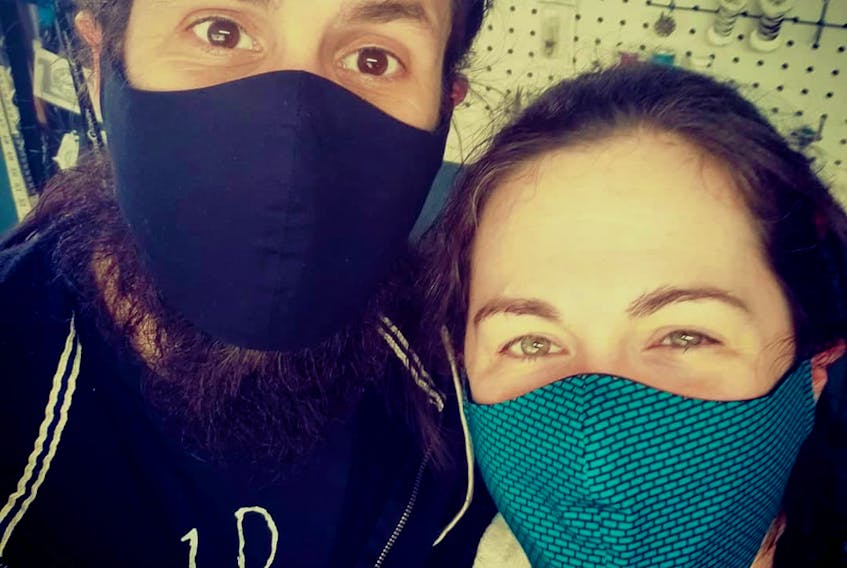ST. JOHN'S, N.L. — Peter Jackson
Local Journalism Initiative Reporter
@pjackson_nl
Around the world, experts are increasingly extolling the benefits of wearing cloth face masks to stem the spread of COVID-19.
In Newfoundland and Labrador, the message appears to be lost on most.
Donna Moralejo is pretty sure she knows why.
“I think it’s because people feel very comfortable with the fact that we’ve had no new cases for five weeks now, and so they think the virus is not circulating here,” she said this week. “In fact, today, that’s probably true.”
Moralejo, a professor in Memorial University’s faculty of nursing who specializes in infection control, says the problem is that as people get out more and borders start to open, that’s no longer going to be the case.
“I think people don’t understand exponential growth — if you have one or two cases, how quickly it can spread and get out of control,” she said in an interview. “So it’s not visible until suddenly you have a huge problem.”
More and more jurisdictions around the world have made masks mandatory in public spaces. Even the U.S., where weak leadership and resistance to science has had tragic consequences, governors in at least 24 states have now implemented various rules mandating masks in certain circumstances.
Growing acceptance
In Canada, while mandatory mask policies tend to be spotty, the public is slowly starting to get the message. By the end of June, a Leger poll found 60 per cent of the population was in favour of implementing mask requirements. (Similar polls in the U.S. put the number at 70 per cent.)
Support for mask wearing has been boosted by successive studies that demonstrate how effective they are.

The one that appears most cited was published by the U.S. National Academy of Science on June 30.
The study, which focused on the epidemiology in China, Italy and New York City, mapped the noticeable decline in COVID-19 cases when masks were introduced in these high-prevalence regions.
“(A)irborne transmission, particularly via nascent aerosols from human atomization, is highly virulent and represents the dominant route for the transmission of this disease,” the authors concluded. “However, the importance of airborne transmission has not been considered in establishment of mitigation measures by government authorities.”
This represents a significant change in thinking from the early weeks of the pandemic, when it was believed the coronavirus was transmitted primarily through larger respiratory droplets and contact. It means the coronavirus can remain airborne and contagious for longer than originally thought.
Studies like these — as well as experience — are what motivated a group of frontline health workers in Canada to form a lobby group called Masks4Canada at the beginning of May. The group penned open letters last month to leaders in Alberta, Ontario and Quebec pleading for a stronger emphasis on masks.
“While the masking recommendation went from, ‘Yes, you can wear a mask,’ in April to, ‘highly recommend’ in May, we weren’t feeling like we were getting the traction in the public with regards to masking and how we can actually protect the economy as people come out of lockdown,” Dr. Amy Tan, a family doctor in Alberta and member of the group, said in an interview this week.
“We need to be doing this as an added layer on top of other public health measures.”
No shaming
Tan said the group does not seek to be confrontational, and does not endorse criminal or monetary fines.
“What we’re really asking for through the mandate is to normalize and socialize mask wearing for the foreseeable future in Canada,” she said.
“As Canadians, I think we pride ourselves on looking out for each other, and this is another way that we can look out for each other.”
Both Tan and Moralejo agree the goal is to get to 80-90 per cent mask usage in public spaces, and that it’s unrealistic to expect full compliance when some people may have valid health reasons not to wear them.
“I would hesitate about making them mandatory for everybody, but I would certainly like to see 90 per cent of the population wearing them,” Moralejo said.
Dr. Janice Fitzgerald, Newfoundland and Labrador’s chief medical officer of health, has been reticent to go further than strongly recommend them in tight quarters, but said Wednesday she is flexible.
“At the moment, we’re not considering mandatory masks,” she said. “If we have a change in prevalence of COVID-19 in the province, then we may have to reconsider that.”
Peter Jackson is a Local Journalism Initiative reporter covering health for The Telegram









